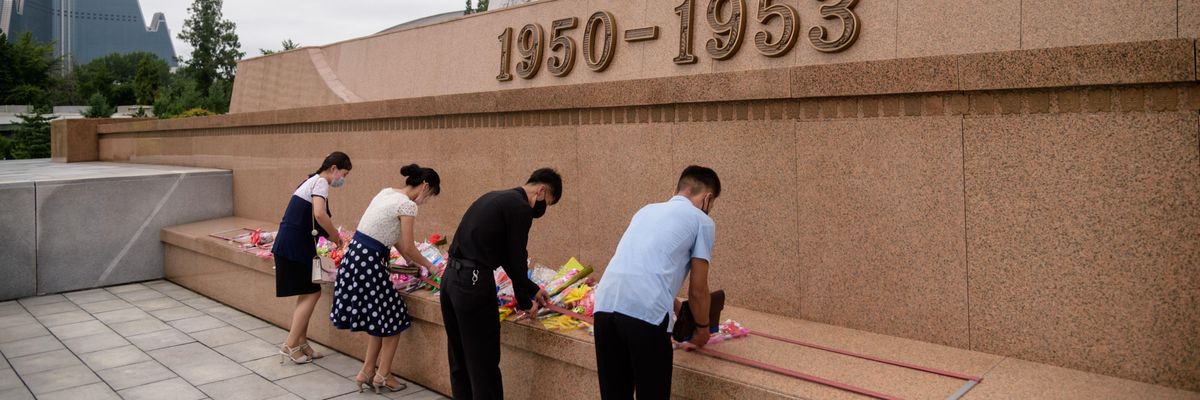Like many Americans, I grew up largely ignorant of Korean history. Even though I was born in South Korea and lived there until age 12, I didn't know, for example, that the Korean War technically never ended and was only halted by an armistice. I never heard anything that diverged from the dominant narrative that the US presence in Korea was only as a benevolent protector.
But all that became complicated in 2000, when I visited South Korea and the site of the No Gun Ri massacre, where US troops killed hundreds of South Korean citizens during the war, and the seaside village of Maehyang-ri, where a US bomber had recently dropped six 500-pound bombs. I saw firsthand the bombshells piling up on the shore and heard stories of pregnant women having miscarriages due to the noise.
I realized that the threat and impact of the unresolved Korean War is very current to my homeland, and the only way for peace to begin on the Korean Peninsula is for the United States to end the war with North Korea.
That's why this week, I am joining hundreds of people across the country--mostly Korean Americans--to urge members of Congress to support the Korea peace process as part of the "National Action to End the Korean War."
The annual event, which started six years ago and has grown from just a dozen people to more than 200, reflects the growing political participation of Korean Americans. This year's event will consist of virtual lobby visits with 167 Congressional offices in 31 states.
For Korean Americans like myself, ending this forever war will not only help reunite families and stop the endless arms race, it will also be an important step toward healing the division within our own community.
While Korean Americans aren't a monolithic political group and don't share the same opinion on what to do about North Korea--in fact, the four Korean Americans in Congress are divided equally on this issue--there is a growing and vocal contingent advocating for a peace-first approach. They often have family members in North Korea, or were impacted (directly or indirectly) by the Korean War, which killed approximately 4 million people, most of them civilians. Most everyone would agree that another military conflict on the Korean Peninsula--especially one involving nuclear weapons--should be avoided at all costs.
Unfortunately, since President Biden took office, there has been little movement toward renewed diplomacy with North Korea. US officials have said they're ready to resume talks, but North Korea shows little eagerness to do so.
That shouldn't be surprising given that the Biden administration's strategy doesn't seem to offer anything new. While recognizing that past approaches have failed, the administration has yet to put forth a realistic plan that would advance peace or diplomacy with North Korea.
Like many Korean Americans and peace activists, I believe that the unresolved status of the Korean War is the root cause of tensions between the two countries. July 27 will mark the 68th anniversary of the armistice signing. Replacing the armistice with a peace agreement would help build a foundation of trust between the United States and North Korea, which is necessary to then address issues such as denuclearization and human rights.
One tool to advance this strategy is H.R.3446, the Peace on the Korean Peninsula Act, introduced by Rep. Brad Sherman, which calls for serious, urgent diplomacy in pursuit of a binding peace agreement to formally end the Korean War. In the last Congress, H.Res.152, which also called for formally ending the Korean War and a peace agreement, garnered 52 co-sponsors. I hope there will be even more support for H.R.3446.
Another tool that could help restart diplomacy with North Korea is H.R.1504/S.690, the Enhancing North Korean Humanitarian Assistance Act, which aims to ease the impact of sanctions on much-needed humanitarian aid to North Korea. There's also H.R.826, the Divided Families Reunification Act, to facilitate the reunion of Korean Americans and their family members in North Korea. Many Korean Americans still have family members in North Korea whom they remain separated from--another tragic consequence of the unresolved Korean War.
By cosponsoring these bills, members of Congress would send a strong signal to the Biden administration that there are concrete steps the United States can take to end the stalemate with North Korea. As the Korean War drags on, and North Korea continues to develop its nuclear weapons, the need for a new strategy is urgent.
For Korean Americans like myself, ending this forever war will not only help reunite families and stop the endless arms race, it will also be an important step toward healing the division within our own community. War has divided us for too long. It's time we come together in the name of peace.

